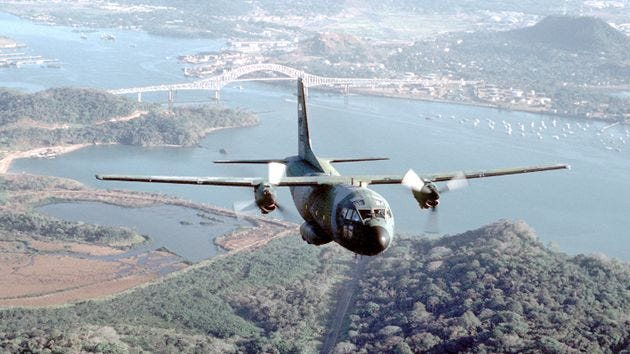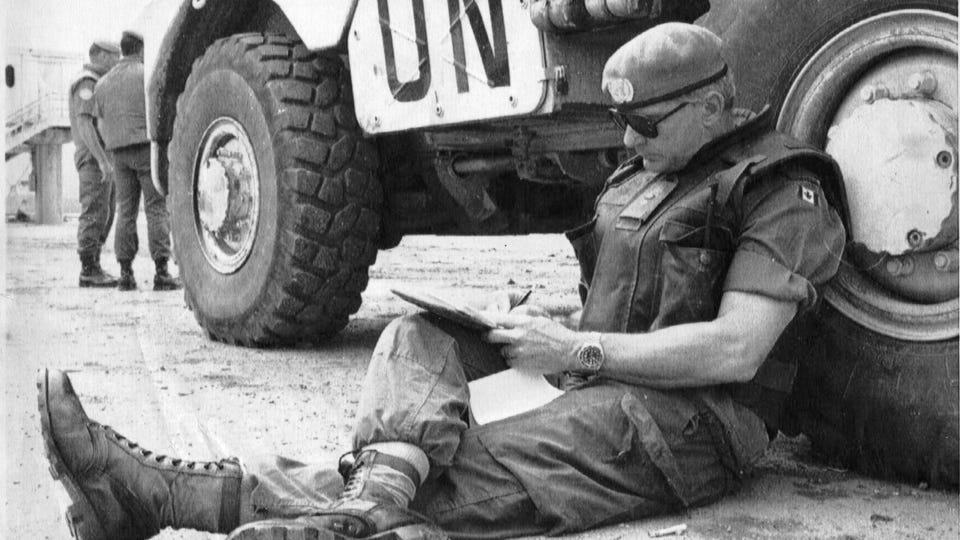September 1992.
Another attempt by international powers to find a diplomatic solution to the war in Bosnia and Herzegovina took place in London.
However, the war is considered an ethnic conflict, whose responsibility is shared between all warring parties [you can listen to the latest episode of BarBalkans - Podcast here].
Meanwhile, the Serbian aggression against Bosnia continues, with the destruction of the Vijećnica (the National Library) during the siege of Sarajevo.
And the extremist stance of Franjo Tuđman in Croatia - both towards the Serbian minority and towards internal opposition - and the territorial aims on the Bosnian region of Herzegovina are increasingly more evident.
Tensions between Sarajevo and the Western powers
The tranquillity of the Western diplomacy is shaken by the shooting down of an Italian Air Force aircraft on September 3, while carrying humanitarian aid through the airlift over Sarajevo.
Four soldiers die in the crash, but none of the warring parties claim responsibility for the shooting of the aircraft that left from Split and crashed on the slopes of Mount Zec (Fojnica), 30 kilometers from the Bosnian capital. In any case, the airlift is temporarily suspended.
Five days later, the Army of the Republic of Bosnia and Herzegovina tries to break through the enemy lines in the suburbs of Butmir, near Sarajevo airport.
But the military advance is stopped by a French brigade of the UN Blue Helmets (that should only escort convoys or defend themselves, not enforce peace through force, according to Resolution 770), allowing the Bosnian Serbs to retreat without too many losses.
Two French soldiers are shot dead in the fighting. The Bosnian Army and government are accused of terrorism by UNPROFOR and the French authorities.
However, for months UNPROFOR has been increasingly despised by the people of Sarajevo. And not only for the inability to defend civilians during the five months of siege.
In Bosnia and Herzegovina mostly volunteers arrive because of the good pay and the possibility of doing business on the black market, rather than for noble and humanitarian reasons.
Many UN soldiers (including high-ranking officers) are seen in the brothels, where Muslim girls and women are sexually exploited, in the neighbourhoods controlled by Bosnian Serbs.
The allegations involve General Lewis MacKenzie, who is forced to resign for a series of cynical statements on the chances to reach peace in Bosnia.
His departure from Sarajevo is full of resentment towards the Bosniaks, with every intention of influencing Western public opinion and politics.
Blue Helmets and arms smuggling
Actually, UNPROFOR tries a phase of renewal, doomed to failure because of a lack of determination.
MacKenzie is replaced by the Egyptian General Hussein Abdul al-Razek, who falls victim to his own radicalism in critizing the UN mission and to his explicit demand to use force to enforce peace.
This is why, on September 30, the command is handed over to the French General Philippe Morillon, who tries to bring more discipline to the Blue Helmets.
Meanwhile, the renewal process also involves the UN Security Council. Resolution 776 of September 14 establishes a special command in Bosnia and Herzegovina, with operational autonomy from Zagreb headquarters. It is also decided to set up four new operational zones.
But limitations to the use of force exclusively for self-defence is not changed, nor is the financial (and operational) conditioning of the countries that provide the contingents.
Despite the violence on the civilian population they witness on a daily basis, the Blue Helmets are still limited by their humanitarian - and bureaucratic - mandate.
The government in Sarajevo cannot tolerate the fact that they are not operating in the territory controlled by Serbs of Bosnia, who continue the ethnic cleansing (particularly in the Banja Luka area) undisturbed.
Bosnian politician Ejup Ganić, well known for his colourful metaphors (such as «Coffee time is over»), effectively sums up the contentious relationship between Sarajevo and the Western powers over UNPROFOR mission:
«We were expecting a surgeon and instead they sent us a nanny».
A nanny who sometimes wants to be a surgeon, trying to help the besieged Sarajevans. But always blocked by high-ranking officers, who remain silent.
General Morillon himself imposes the appeasement policy on the mission. Loyal to the strategy of the French President, François Mitterrand, he is convinced that the Blue Helmets should not take side in favor of any of the warring ethnic parties, in order to save as many lives as possible.
The war in Bosnia is a civil war (not a war of aggression by Belgrade), where all warring parties are responsible to some extent. This is the interpretation in Paris and now also at the UNPROFOR headquarters.
But the appeasement policy of acquiescence plays into the hands of the strongest warring party - Serbs and Bosnian Serbs. The situation is worsened by the indiscriminate arms embargo on the entire territory of the former Yugoslavia that is proving more and more to be the greatest hypocrisy of the Western powers.
While Ratko Mladić’ Bosnian Serb depots are full of weapons of the dismantled Yugoslav People’s Army (JNA), the other warring parties desperately need them.
Where there is a demand, the market gives an answer. Always. And if it cannot be done legally, the smuggling routes swell.
The Bosniaks - feeling betrayed by Western Europe and the U.S. - ask for the help of the Islamic area. Arms and money supplies flow from Saudi Arabia, Turkey, Pakistan, Iran, Malaysia and Brunei, as well as the extremist organizations Al-Qaeda, Hezbollah, Harkat ul-Ansar and the Armed Islamic Group of Algeria.
The town of Travnik - former seat of Turkish viziers - becomes the base of mujaheddin veterans of the Afghan War, strengthening the Western European fears of a rise in Islamic radicalism in Bosnia (but fueled by their own lack of support for the authorities in Sarajevo).

The Croats and Bosnian Croats obtain their arms supplies mainly from Bolivia and South Africa, thanks to the web of relations weaved by the Croatian diaspora.
A major support also comes from the arms industries in Germany, Austria, Italy and in the European countries of former Soviet Union.

The Serbs and Bosnian Serbs also continue to fill their arsenals, receiving war material from Russia (where the KGB set up special private companies with the participation of the Russian mafia).
Other actors involved in this affair are the Christian Maronites of Lebanon, the Copts of Egypt, the right-wing circles in South Africa, and Israel, Syria, Iraq and North Korea.

Red card to Yugoslavia
What the Western world seems to do best is to initiate peace processes and to push on diplomacy.
Following the London Conference, on September 18, the Geneva talks take place at the UN headquarters. It is an almost impossible mediation, for several reasons.
First of all, because the Bosnian President, Alija Izetbegović, refuses to sit at the same table with the representatives of the Croatian Republic of Herzeg-Bosnia and of Republika Sprska.
Secondly, because the Serbs immediately betray the promise made in London to cease the bombing of Sarajevo.
Almost unexpectedly, something historical happens in New York. On September 22, Yugoslavia is expelled from the UN General Assembly.
Following the economic sanctions adopted in May against Slobodan Milošević, Resolution 777 recognizes that the Socialist Federal Republic of Yugoslavia has ceased to exist and that the Federal Republic of Yugoslavia cannot inherit its seat at the United Nations.
The Resolution is adopted with 127 votes in favour, 6 against, 26 abstentions and 20 absences. To rejoin the UN General Assembly, the Serbian Montenegrin Federation must reapply for membership.
This is a hard blow to the internal prestige of Serbian President Milošević, who has always pushed in every international forum for the recognition of exclusive legacy of Tito’s Federation to Serbia.
If you know someone who can be interested in this newsletter, why not give them a gift subscription?
Here is the archive of BarBalkans - Podcast:
And here the summary of 1991.



















Share this post